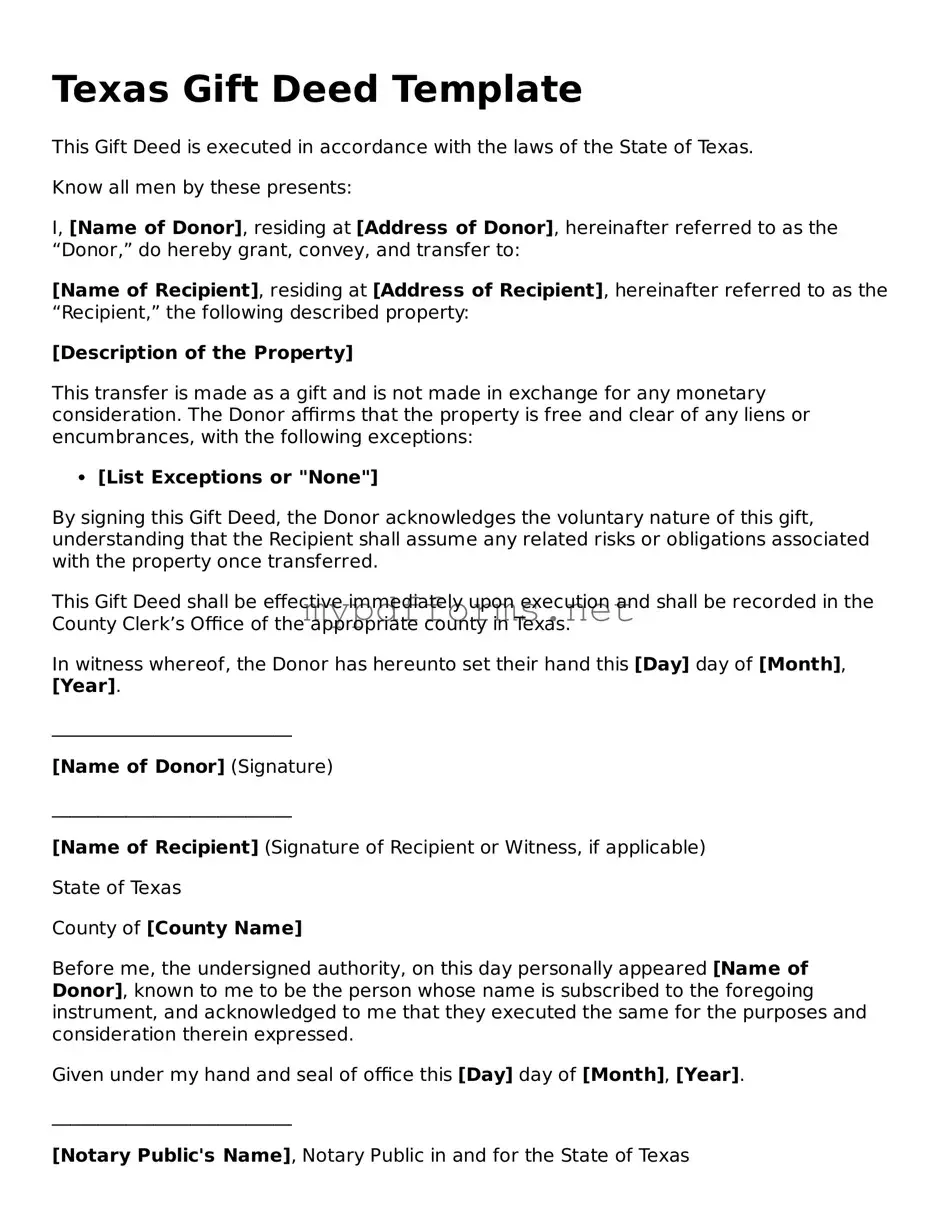The Texas Gift Deed form shares similarities with the Warranty Deed. Both documents transfer ownership of property from one party to another. However, a Warranty Deed offers a guarantee that the property is free from any liens or claims, providing a higher level of security for the buyer. In contrast, a Gift Deed does not include such warranties, as it is typically used to transfer property without any exchange of money or consideration.
Another document akin to the Gift Deed is the Quitclaim Deed. Like the Gift Deed, a Quitclaim Deed transfers ownership rights without any warranties. This means that the grantor simply relinquishes their interest in the property, but does not guarantee that they hold clear title. Both documents serve to transfer property, but the Quitclaim Deed is often used in situations like divorce or among family members where the parties have a level of trust.
The Special Warranty Deed is also similar to the Gift Deed in that it transfers property ownership. However, it differs in that it only provides limited warranties. The grantor guarantees that they have not encumbered the property during their ownership but does not cover any issues that may have existed before their ownership. This makes it less protective than a Warranty Deed but more secure than a Gift Deed.
Another related document is the Bargain and Sale Deed. This type of deed implies that the grantor has title to the property but does not provide any warranties against claims. While a Gift Deed is typically used for no consideration, a Bargain and Sale Deed often involves a nominal payment, suggesting a transaction has taken place. Both documents facilitate the transfer of property but differ in the implications of ownership rights.
The Deed of Trust is also comparable to the Gift Deed, though it serves a different purpose. A Deed of Trust secures a loan by placing the property as collateral. While it does not transfer ownership outright, it involves a similar process of documenting the property and the parties involved. Unlike a Gift Deed, which is a voluntary transfer without compensation, a Deed of Trust is a legal instrument tied to a financial obligation.
The Affidavit of Heirship is another document that shares a connection with the Gift Deed. This affidavit is used to establish the heirs of a deceased person and can facilitate the transfer of property without going through probate. While a Gift Deed is a proactive transfer of property during a person’s life, an Affidavit of Heirship often comes into play after death, allowing heirs to claim property rights without formal court proceedings.
When considering property transfers in Washington, a comprehensive understanding of various deed forms is essential, including the Quitclaim Deed, which provides no warranties. For those looking for a fillable template for the Washington Quitclaim Deed, you can visit https://quitclaimdocs.com/fillable-washington-quitclaim-deed to ensure proper documentation and compliance during the transfer process.
The Lease Agreement also bears some resemblance to the Gift Deed, particularly in terms of property use. While a Gift Deed transfers ownership, a Lease Agreement allows one party to use the property owned by another for a specified period in exchange for rent. Both documents involve an understanding between parties regarding property rights, but they operate under different legal frameworks and intentions.
Finally, the Easement Agreement is similar in that it allows one party to use a portion of another party’s property for a specific purpose, such as access or utilities. While a Gift Deed transfers full ownership, an Easement Agreement permits limited use without transferring title. Both documents reflect agreements about property use but differ significantly in the rights and obligations they create.

